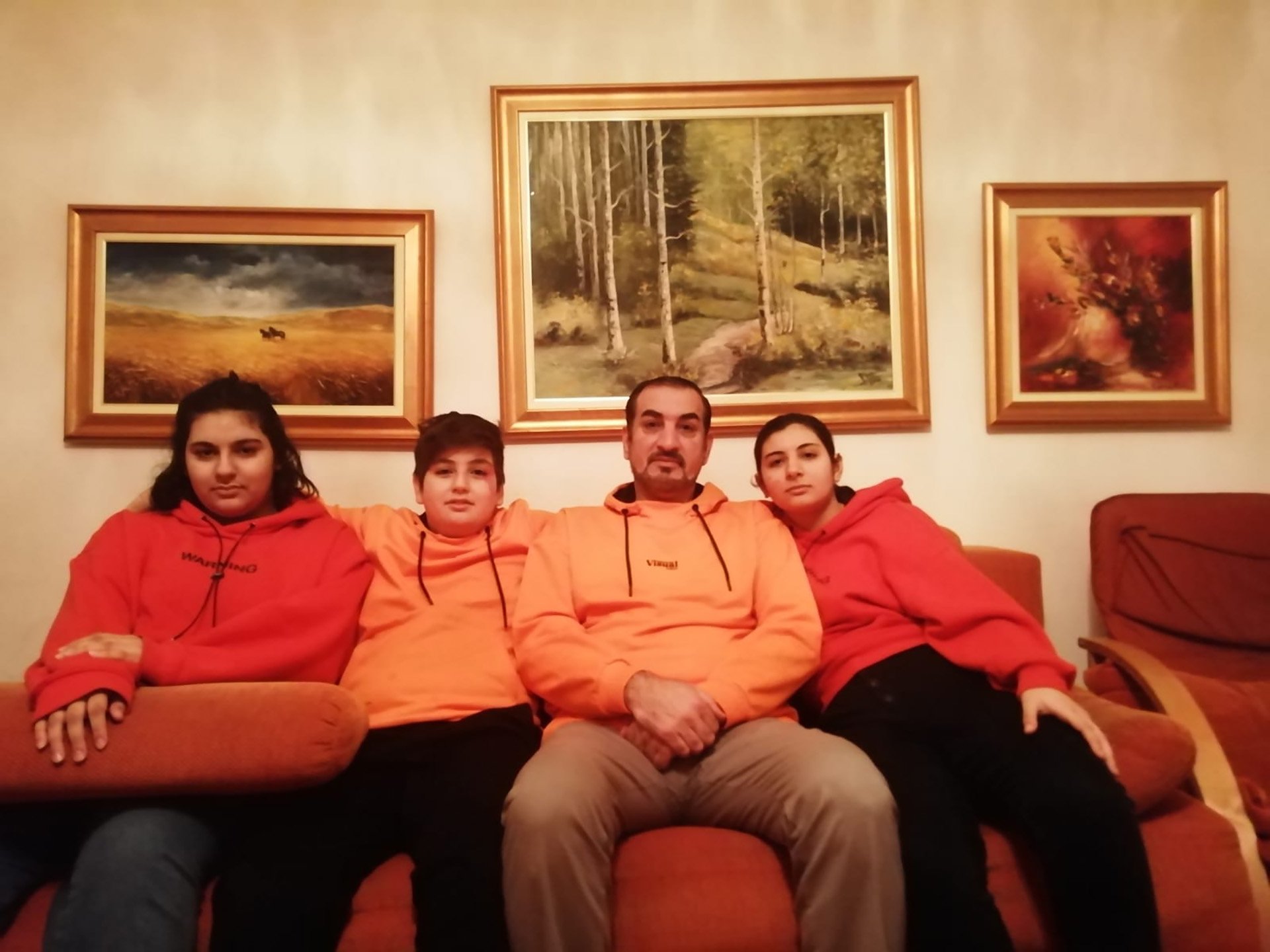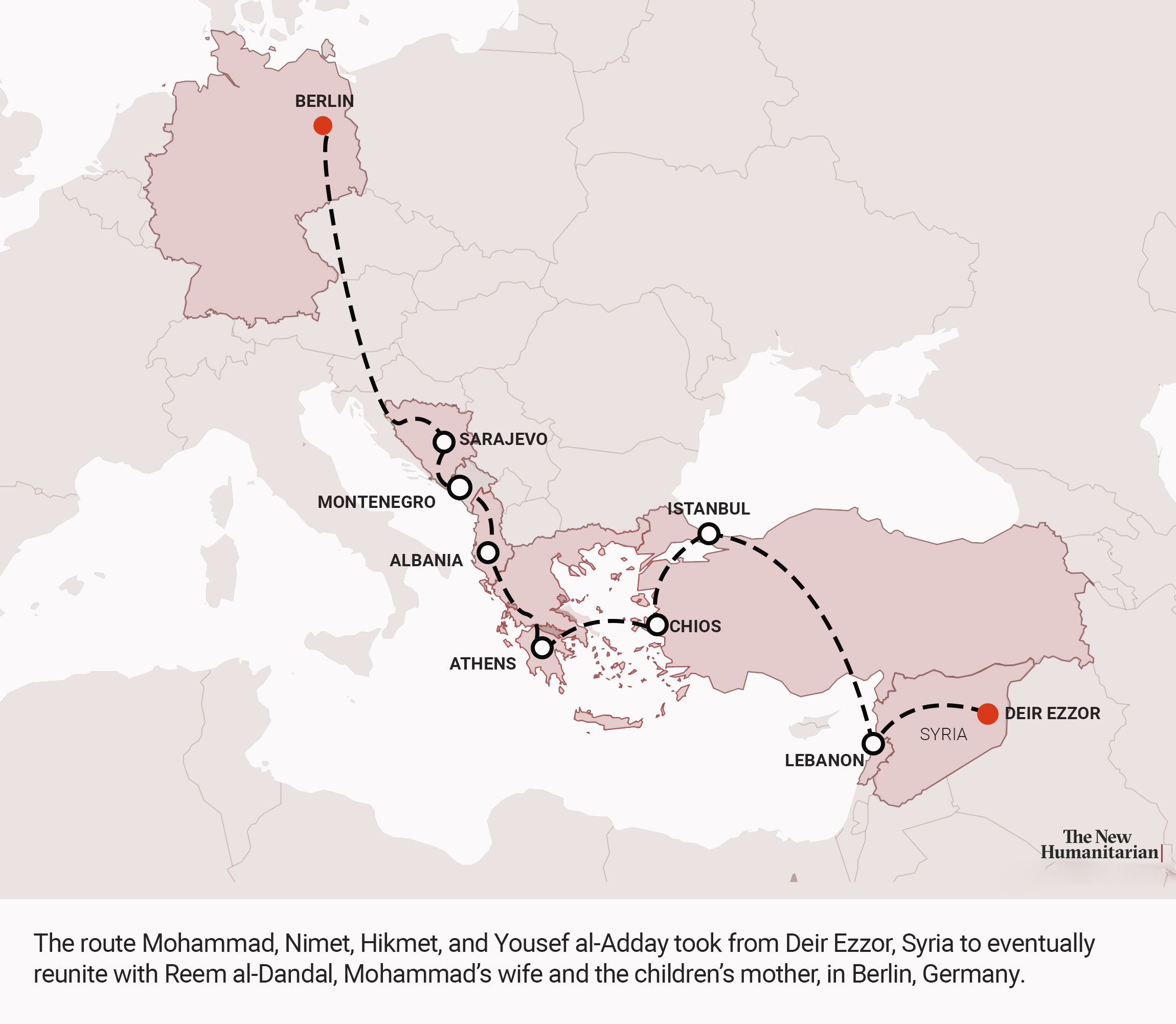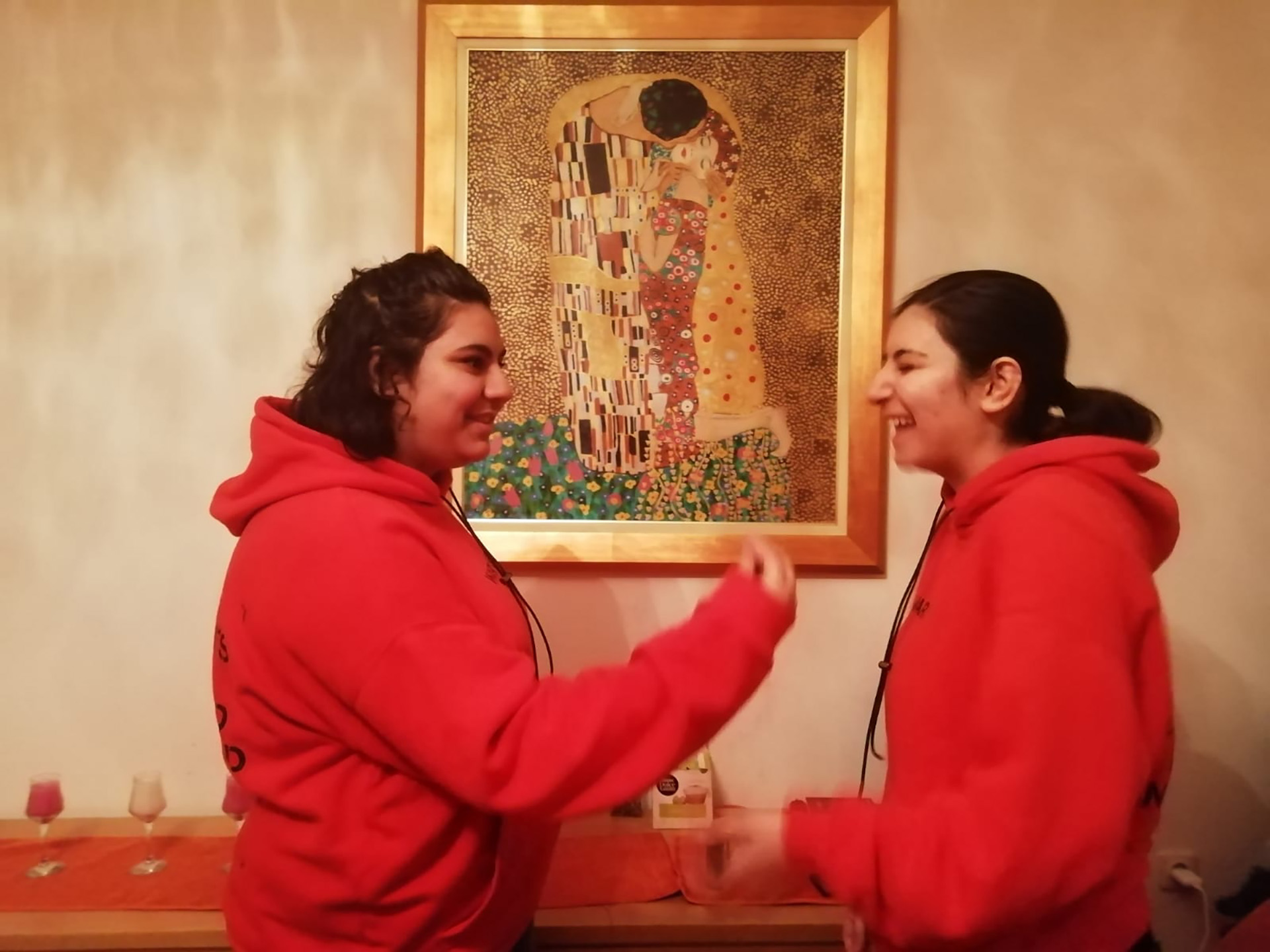“The trouble started when we decided to do things legally. And it is because of the law that we have been stuck without seeing our mother for years,” said Nimet al-Adday, 17.
Nimet, the eldest daughter of the al-Adday family, from Deir Ezzor in Syria, sat in the family’s flat in Sarajevo on a February day with her father, Mohammad, 47; her sister, Hikmet, 15; and her brother, Yousef, 13. The four were staring in disbelief at the new German visas stamped in their Syrian passports, received days earlier.
They had waited five years for these visas that would allow them to travel legally to Germany and reunite with Reem al-Dandal, Mohammad’s wife and the children’s mother. She had been granted political asylum in Berlin in 2018. They had last seen her a few months before that, as she boarded a plane to Germany.
Their years in limbo illustrate how the European Union’s system of family reunification is failing some of the very asylum seekers and refugees it was designed to assist and protect, the family as well as lawyers and NGO workers who have been involved in reunification requests told The New Humanitarian in interviews earlier this year. Bureaucracy, uncertain waiting periods, and lack of clarity about the application process create frustration, which pushes individuals and families to opt for irregular and dangerous routes to reach relatives.
The al-Adday’s long wait ultimately ended successfully, with their entry to Germany. But they do not regard theirs as a success story in terms of EU reunification policy. After years of waiting and answering requests for more and more paperwork, their application was initially rejected by Germany, the family says.

Under EU asylum law, family reunification is intended to offer a legal route for asylum seekers to relocate to countries where close relatives have been granted protection. This allows them to avoid dangerous journeys involving smugglers and undocumented border crossings.
Recent data is difficult to come by, especially overall numbers of applications per country, but hundreds of thousands of people have legally entered the EU via the formal reunification process. In 2017 close to 500,000 people entered EU nations on reunification grounds. But the process is often fraught for some applicants, like the al-Addays, as safe and legal pathways increasingly appear out of reach with each new hurdle.
The process “is paved with obstacles, preventing many from accessing this right,” explained Andreas Eibelshäuser, former legal assistant at Berenice Böhlo Attorneys in Berlin, a private firm that has handled hundreds of asylum cases, including the al-Adday family’s reunification application.
These obstacles can include unclear guidance on the application process, difficulties accessing embassies in order to submit an application, and challenges in obtaining travel documents from remote or conflict-ravaged areas. Eibelshäuser described these as “a considerable amount of obstacles for institutions that claim to highly discourage irregular migration to the EU.”
Additionally, most EU countries apply a time limit within which an application for family reunification has to be submitted – usually three months from the moment international protection is granted. Many people are unable to access legal support quickly enough to help them navigate that process, said Eibelshäuser, who has provided legal assistance to refugees and asylum seekers in Greece and Germany for the past five years.
Despite a common convention laying out reunification procedures for people within the EU, not all countries work in the same way. The experience is particularly difficult for people like the al-Addays who apply from a third country outside the EU, asylum lawyers working within the EU told The New Humanitarian. Timely bureaucratic cooperation between the host country and the receiving country is often a problem, as the al-Addays found out, and can result in additional delays. The process is often lengthy to begin with, taking months or several years, and in Germany and elsewhere it has been further slowed since 2020 by the pandemic.
In Bosnia, on the doorstep of the EU, the success rates for relatives there who apply for reunification with family members already in EU countries is extremely low. Since 2015, 12 applications out of a few hundred known to the UNHCR, the UN refugee agency, were approved by EU states, and four asylum seekers are currently awaiting a final decision from receiving countries, said Vanes Pilav, communications associate at UNHCR Sarajevo.
The four applications by the al-Adday family are among those 12 that were approved – though it was a frustrating journey to get the German visas they first requested in 2018.
A long journey, then a swift separation
Mohammad and his children arrived in Bosnia in 2018, after travelling overland via undocumented border crossings from Greece through the Balkans – a journey that asylum seekers and migrants call “the game”. From there, they tried to reunite with Reem, who had reached Germany by plane in October 2017 using a fake passport, by applying for family reunification. What followed – the separation, living in limbo for years – had not been part of their plan.

Prior to the beginning of the Syrian revolution-turned-civil war in 2011, the al-Addays led a comfortable life on the outskirts of Deir Ezzor, Syria. Mohammad was a businessman, Reem was an employee at the Ministry of Economy, and their children were expected to attend private schools. But when the revolution slowly escalated into conflict in 2011, Reem was accused of collaborating with the government of president Bashar al-Assad, and received multiple death threats.
“Everywhere we turned, we found enemies,” Mohammad recounted to The New Humanitarian earlier this year.
He didn’t think twice about fleeing Syria in 2012 with his wife and three children, he said. The family’s first stop was Lebanon, which they reached by car. From there, they took a flight to Istanbul, where they lived for more than three years. But in Turkey they felt they faced discrimination for being Syrian, Mohammad said.
So – like hundreds of thousands of other refugees – in October 2016 Mohammad decided to pay a smuggler to bring his family to Greece.
After surviving a dangerous boat journey across the Aegean Sea and registering in a refugee camp on the island of Chios, all five family members applied for asylum in Greece. They waited for several months, with no resolution to their application. “The officials of the asylum commission did not have time to listen to our stories,” Mohammad said. “They would always tell us, ‘Come back tomorrow.’ ”
Reem passed smoothly through the final security check. Mohammad and the children were pulled aside.
Like thousands of other refugees, the family concluded that taking an undocumented route to Western Europe was the quickest way to escape the dismal conditions in Greece. They bought five fake passports for about 4,000 euros total and plane tickets to Germany.
At the Athens airport in October 2017, Reem passed smoothly through the final security check. Mohammad and the children were pulled aside. Reem boarded the flight to Germany, but her husband and children never did.
Weighing the risks: legal or irregular routes?
A few months after arriving in Germany, Reem was granted political refugee status in early 2018. Still in Athens, Mohammad and the children decided to start the family reunification process.
Mohammad hired a lawyer, who the family says disappeared after receiving his fee without doing anything to help them. Other lawyers they turned to lost some of their original documents and took so long to file the application that they missed the three-month deadline.
“They were left with the only option of reaching Germany illegally, again, despite qualifying for a regular immigration route,” said Silvia Maraone, Balkans coordinator of the Istituto Pace Sviluppo Innovazione Acli, an Italian NGO that helps migrants and refugees in Bosnia, including the al-Addays.
“One thousand five hundred kilometres overall, most of those on foot.”
Still in Greece, Mohammad was reluctant to put his children in danger by following routes that would expose them to violence from security forces at borders they would have to cross without documentation. But the absurdity of EU legal procedures gave him no other choice, he said. He and the children resumed their journey in the first half of 2018.
“We travelled with other asylum-seeking families from Syria and Afghanistan through the mountains of Albania and Montenegro, then Bosnia,” he said. “One thousand five hundred kilometres overall, most of those on foot.”
When they tried to cross the border into Croatia, an EU member state, border guards pushed the family back to Bosnia. Physically and mentally exhausted from the journey, the family decided to stop on the doorstep of the EU and give the EU’s family reunification laws one last chance to work for them.
“To this day, I regret that decision,” said Mohammad, recounting the family’s story from their Sarajevo flat.
His daughter Nimet nodded. “We all do,” she reassured him. “We never thought we’d prefer the dangers of the cold and wild animals to the limbo we’ve been condemned to.”
Mohammad kept in touch with some of the other families he and the children had travelled with, and he heard about how those families tried again to enter Croatia and managed to reach Germany in a matter of weeks.
From Bosnia, the family applied again for family reunification in the spring of 2018, requesting to travel legally to reunite with Reem. German authorities asked for a series of expensive documents over the next three and a half years, while Bosnian authorities who were asked to send information to support the al-Adday’s application would often file documents late, the family said.
In September 2021, Germany rejected the al-Adday’s reunification request.
Mohammad says the rejection letter stated that the request had been filed after the three-month deadline to apply for family reunification had passed, and that Reem’s job and accommodation at the time of the application didn’t meet the necessary criteria to host her relatives.

The German Federal Office for Migration and Refugees did not respond to several requests by phone and email from The New Humanitarian to confirm why the al-Adday’s application had been rejected or for comment on the reunification process.
The rejection was a severe blow to the al-Addays.
But in late November 2021, they had a stroke of luck: A group of European Parliament members who had learned about their case through Maraone’s advocacy efforts launched a public campaign to lobby Germany to revisit the application and grant visas to the family.
In late March, a month after the al-Addays recounted their reunification experience to The New Humanitarian in Sarajevo, Mohammad and the children traveled by plane to Germany and reunited with Reem.
But the resolution to their story was bittersweet, the family said: In the end, their decision to pursue legal reunification took five years, much longer than the suggested average timelines, and certainly longer than the time it took the families they had originally traveled to Bosnia with, who took irregular routes into Germany. The al-Addays also noted that they were reunited not because the official EU process worked for them but because their case garnered enough attention for them to be granted an exception.
Mixed messages on migration
In the two decades prior to 2015, family reunification was a main route of formal immigration into the EU. But after 2015 and 2016 – when more than one million refugees, asylum seekers, and migrants crossed the Mediterranean to Europe in a little over a year – things began to change. Some countries placed limits on who could apply for family reunification.
Many asylum seekers in Germany, for example, are granted subsidiary protection: They don’t qualify as refugees under the definition in the 1954 Refugee Convention but are still considered to be in need of short-term humanitarian protection.
In 2018, Germany issued more than 30,000 visas to family members of people with international protection, both refugees and others. Late that year, however, the government capped the number of family reunification visas it would issue to people with subsidiary protection at 1,000 per month, or 12,000 annually. Since then, Germany has consistently fallen short of meeting the annual quota.
“It is somehow a paradox that the EU says it doesn’t want illegal refugees, but then makes regular migration almost impossible.”
For family reunification to be an option in the first place, a close relative must already be present in the EU. For people from countries such as Syria, Afghanistan, Yemen, or others experiencing protracted conflicts that have produced large refugee populations, securing a visa to enter the EU is nearly impossible. So in most cases, at least one family member has to undertake a risky, undocumented journey in order for others to have the option to travel legally. “It is somehow a paradox that the EU says it doesn’t want illegal refugees, but then makes regular migration almost impossible, thus forcing people to resort to irregular, and dangerous, routes that only create more deaths,” Eibelshäuser said.
‘Years of time and psychological hurdles’
The al-Adday family says the impact of their ordeal will stay with them for a long time. While in Greece, Mohammad said, he suffered a severe heart attack because of the psychological burdens, and since then his physical and mental health has not been the same.
Studies have found that forced separation from loved ones can affect peoples’ ability to integrate into their new communities and negatively impact their physical and emotional health. “When we do not allow people to reunite, we exponentially decrease their trust in human beings and institutions,” explained Diego Manduri, a psychologist with Approdi, an Italian NGO that works on migration trauma.
Psychologically, prolonged family separation is perceived similarly to torture by people who are fleeing to find a safe haven because the only stable relationships amid the chaos of a violent journey are taken away from them, Manduri told The New Humanitarian by phone in March.
He added that a long wait for a resolution in reunification and other asylum requests “breaks a person’s perception of reality and decreases cognitive skills.”
“The mind is on constant alert, and people are unable to live [in] the present, constantly living in the fear that something new, more violent, will keep them separate from their loved ones for even longer.”
Nimet noted that her family was able to cope better than others thanks to a network of organisations and individuals that supported them: UNHCR paid for their monthly rent, and local charities would cover their food and clothing costs.
“But not all asylum-seekers waiting to reunite with their relatives have that privilege,” Nimet acknowledged, referring to others they met along their journey.
In addition, the al-Addays had some financial resources to rely on, thanks to Reem’s small salary in Germany, but many families do not.
Maraone says there are many cases of families like the al-Addays who have been separated and who have the legal right to apply for reunification but who don’t because the process appears overwhelming — including many she encountered during her work in the Balkans.
For his part, Mohammad is relieved that at least his children were not alone in their journey, unlike many minors who try to make it to Western Europe from Greece by themselves. He said he is sometimes frustrated that they had to learn to be strong at such young ages, but he is proud of the people they’ve become. “My children have learned five languages due to these long waits in different countries,” he said. “They will be successful one day, if given the right opportunities.”
Five years ago, Mohammad could not forgive himself for forcing his family to take irregular routes from Turkey to Bosnia, but now he has changed his mind. “We wish we had gambled our way to Germany through ‘[the] game’, to save us years of time and psychological hurdles,” he said.
“Trusting the system is the real gamble.”
Edited by: Helen Morgan and Eric Reidy








